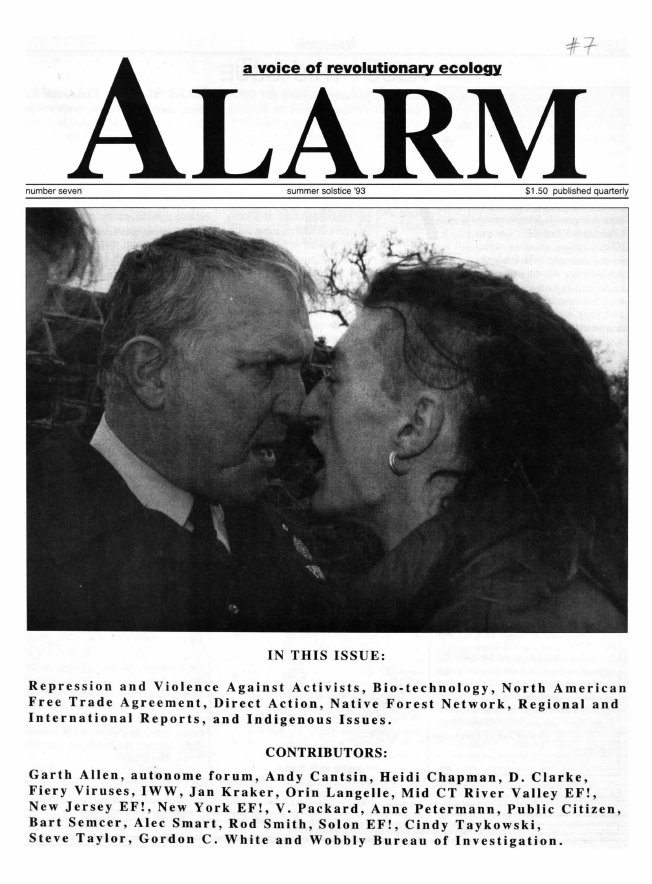The ALARM began in 1991 as a revolutionary ecological news quarterly published by Earth First! groups active in the northeastern United States, emphasizing news and direct actions significant to regional and indigneous groups. The local Earth First! group Biodiversity Liberation Front EF! was its original publisher; issue 3 was the first issue to be broadly circulated. The local group Big River EF! published issue 10, and Mass EF! published issue 11. The Eastern North American Native Forest Network took over its annual publication with issue 12.
Allen, Garth, Andy Buckley, Heidi Chapman, J.R. the terrierist, Orin Langelle, Brian Leeb, Anne Petermann, et. al., eds., ALARM no. 7 (June 1993). Republished by the Environment & Society Portal, Multimedia Library. http://www.environmentandsociety.org/node/7101.
With issue 7 the ALARM changes its subtitle from “a voice of northeast Earth First!” to “a voice of revolutionary ecology” to reflect the feeling of the group Biodiversity Liberation Front EF! that it was too great a responsibility for one group to represent the entire region. While they will continue to report about EF! actions, they wish to draw on a revolutionary ecology perspective to form a more broadly based movement.
So what is the concept of revolutionary ecology? Simplistically, ecology is the interrelationship of organisms and their environment (or studies thereof) and the term revolutionary means causing a very great change. In essence, Revolutionary Ecology is based on the assumption that all the conditions and circumstances affecting the development of life must be drastically changed if they are not in synchronization with the continuation of life itself. […] Deep Ecology leads us to accept that all life is equal (a biocentric or ecocentric point of view). Social Ecology teaches to terminate society’s hierarchical structures in order to find ecological sanity between nature and society. Revolutionary Ecology may be the synthesis of the two.
—Orin Langelle
The original publication carries an anticopyright and antiprofit statement.
The Rachel Carson Center’s Environment & Society Portal makes archival materials openly accessible for purposes of research and education. Views expressed in these materials do not necessarily reflect the views or positions of the Rachel Carson Center or its partners.
- Bari, Judi. Revolutionary Ecology: Biocentrism & Deep Ecology. Melville: Trees Foundation, 1998.
- Lee, Martha. Earth First!: Environmental Apocalypse. Syracuse: Syracuse University Press, 1995.
- Merchant, Carolyn. Radical Ecology: The Search for a Livable World. London: Routledge, 1992.
- Mies, Maria, and Vandana Shiva. Ecofeminism. London: Zed Books, 1993.


